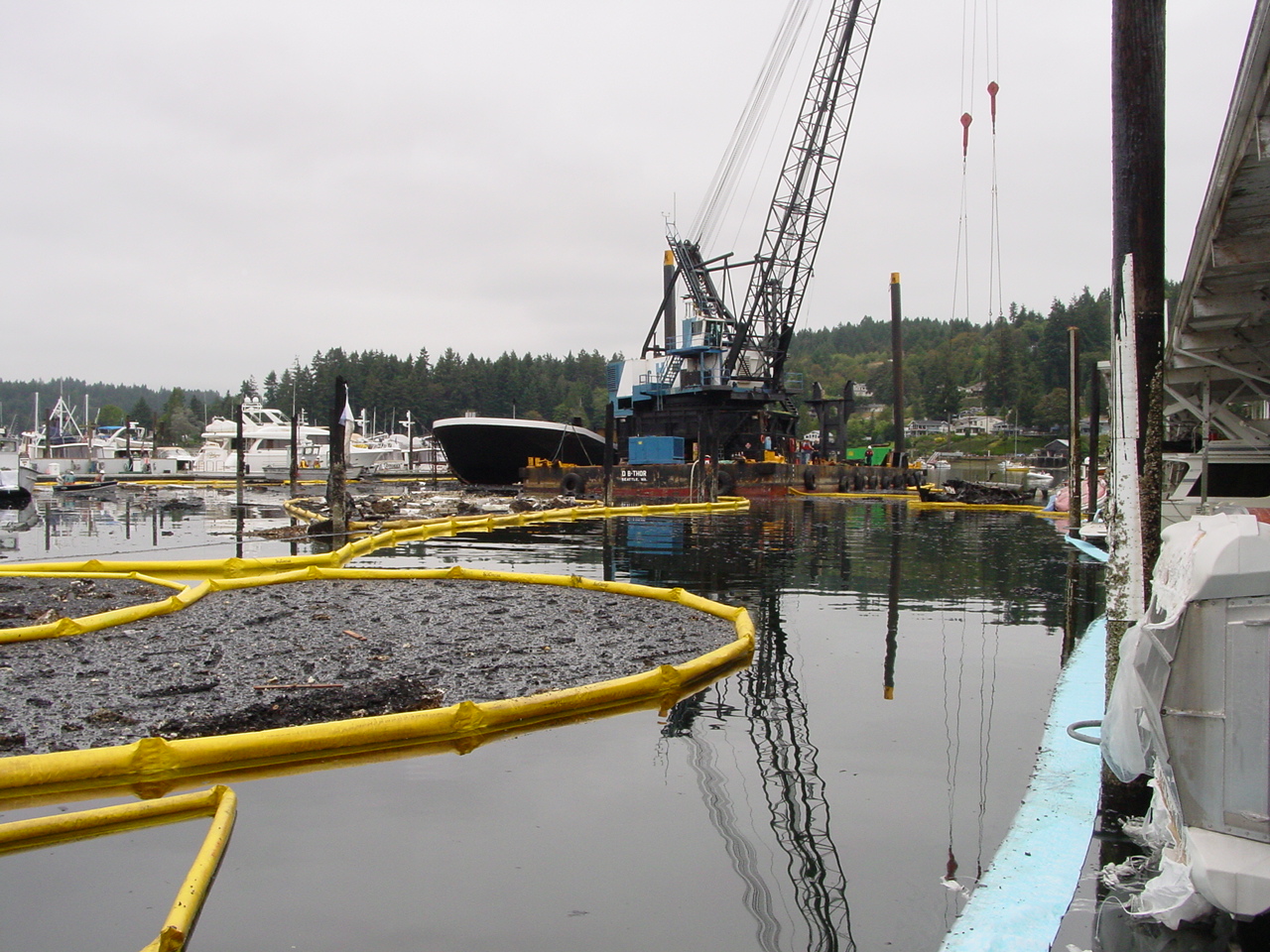Harborview Marina fire at Gig Harbor
The fire was first reported at about 7:15 a.m. and roughly 55 boats were damaged - 48 of those were sunk. Most boats were burned to the waterline. The Gig Harbor fire and police crews deployed spill containment booms that kept oil from the boats that was not burned-off from polluting the waters throughout Gig Harbor.
Summary information
Gig Harbor, WA

Corralled fire debris in water.
Status updates
September 1, 2006
During the oil spill near Edmonds August 30, Ecology responders were able to get a sample of the spilled oil.
The department is now waiting for the results of a lab analysis regarding the type of oil spilled. The analysis should be done next week.
Ecology also is continuing its investigation regarding potential sources of the spill, which at its peak covered about 140 acres of water.
August 30, 2006
The fire was first reported at about 7:15 a.m. Roughly 55 boats were damaged - 48 of those were sunk. Most boats were burned to the waterline. During the initial response, quick action by the Gig Harbor fire and police crews to deploy spill containment boom kept oil from the boats that was not burned-off from polluting the waters throughout Gig Harbor.
Additional containment boom has been placed around the burned marina. Strong diesel odors persistent in the area inside the boom. Small amounts of debris and oil sheen may be seen outside the boomed area. Spill response crews from National Response Corporation and Global Diving and Salvage are removing oily debris and sunken vessels from the water. Recovery efforts are underway with a large crane on scene to remove sections of metal roofing and marina structural members, then sunken boats in the pathway of the crane. By Wednesday morning, September 7th, twenty-two sunken boats had been removed.
The response is being directed through a cooperative effort between the Department of Ecology, U.S. Coast Guard and the City of Gig Harbor.
The cause of the fire remains under investigation by local fire authorities.
Boat owners and insurance representatives may contact the U.S. Coast Guard, MST1 Matt Valenti, (206) 510-8012 for additional information.
The Department of Ecology (Ecology) and U.S. Coast Guard responded to an oil spill that occurred early this morning about one-quarter mile west of the Edmonds Ferry Terminal in Snohomish County.
Ecology sent responders to the spill site to determine strategies to clean up the spill and help keep adverse environmental effects to a minimum.
The department also hired NRC Environmental Services of Seattle and the Marine Spill Response Corp. of Everett to help respond to the spill.
Both firms own a wide array of spill cleanup equipment including oil skimming vessels and spill containment and deflection boom.
Ecology and Coast Guard responders flew over the spill site to help determine the size, and location. The area was found to contain oil sheen and dark algae. The sheen is not recoverable and response assets are standing down.
The source of the spill and type of oil spilled is still under investigation.
All oil spills, regardless of size, add to the toxic load already entering Puget Sound. Preventing oil spills is part of Gov. Chris Gregoire’s initiative to restore and protect the Sound.
Ecology is still investigating potential sources for today’s oil spill near Edmonds.
While the department is identifying vessels that had made transits through the area, Ecology has not ruled out other sources.
The amount and type of oil product has not been determined, but the slick initially appeared to be heavy or thick in places. Subsequent flyovers revealed that the dark patches were not oil.
Separate early-morning over flights by Ecology and Coast Guard revealed that that the oil slick actually was too thin to clean up.
Thin slicks typically are just molecules thick and no known equipment or methods can remove it from the environment. By noon, most of the spill had dissipated.
Even when a spill cannot be recovered and disperses, the oil adds toxic pollutants to an already threatened Puget Sound.
While no oiled birds or wildlife were reported, all petroleum products are toxic, and no spill of any size is acceptable.

